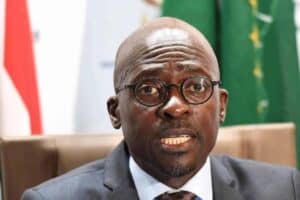Echoing the 'weekend special' minister, Des van Rooyen, the new finance minister says he will be pursuing 'radical economic transformation'.

In his first press conference as finance minister, Malusi Gigaba said in Pretoria that he wanted Treasury to play a stronger role in effecting “radical economic transformation” to change the lives of poor people and speed up the dividends from the democratic project in South Africa.
He acknowledged that he had come into the job at a difficult time, but would not be distracted and focus on his task of bringing change for all South Africans.
“I did not get into politics for myself, but rather to serve the people of this country.”
He played tribute to his predecessors in the finance ministry, who had “inherited a bankrupt country from the apartheid government”.
Gigaba said his focus would be on “radically transforming the South African economy”, particularly for poor black South Africans. He said transformation and economic growth should not be seen as mutually exclusive, and Treasury needed to be used for the purposes of development and change.
“For too long there has been a narrative or perception around Treasury that it belongs primarily and exclusively to orthodox economists, big business, powerful interests and international investors. With respect, this is a people’s government. Treasury, like all the institutions of our democratic state, belongs to the people of South Africa, black and white, rich and poor, young and old, male and female urban and rural.”
He said Treasury should be “accessible” to all South Africans and it did not exist for the exclusive use of those with power and access. This phrase echoed the words of Des van Rooyen in his first speech as finance minister in 2015, before he was removed after just four days.
Gigaba mentioned that he would continue to pursue “an investment grade” from all global ratings agencies. However, he said “we trust and hope that [scrutiny from ratings agencies] will not preclude our ability, creatively and still within our means, to pursue progressive policies to achieve our development objectives.”
He said he “needed space” to do this. Government needed to be self-reliant and live within its means.
Gigaba expressed commitment to sound financial policies to keep national debt in control.
“Over 20 years of managing the nation’s fiscus, the ANC has exercised restraint, prudence and an admirable commitment to balance competing priorities and constituencies.”
He said that the pace of transformation had been too slow and it was time to do more to implement radical economic transformation.
However, this would be done by “staying the course” on the approved government economic plan while prioritising delivery by government.
“We can no longer pretend that growing the economy as it is currently constituted will improve the lives of all South Africans. We need to change our approach. The National Development Plan does not speak only to growth, but to inclusive growth. It speaks to achieving prosperity and equity.”
He said that the fact that the ownership of wealth and assets was concentrated in the hands of a small group of individuals and this needed to change. He spoke of deracialising the economy, and beating unemployment and poverty by growing the economy for inclusive growth.
“It will not be easy. We must rise to the challenge and have no time to waste.”
Gigaba said his plan for the weeks to come would be to consult widely with all stakeholders, and he remained optimistic about the prospects for South Africa’s economy, as well as the global economy.
Procurement reform was well under way.
He said government would “remain unapologetic” about growing the presence and role of black industrialists, and he would be working with the central bank to ensure the financial sector serves all South Africans.
He said strengthening financial management needed to be done “not as an end in itself”, but to improve delivery in the country.
Gigaba vowed that he would not betray the people by allowing the special interests of certain groups to gain favour.
“This moment is not comfortable or convenient, but that is not what leadership is about.”
He acknowledged all the “factions” in South Africa, but he would act for what was best for the country.
He said that “vicious fights” would not build South Africa.
“I submit that what will build South Africa is for us to pull together … let us focus our energies on finding common ground.”






